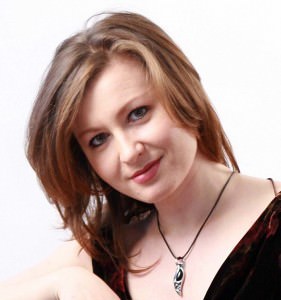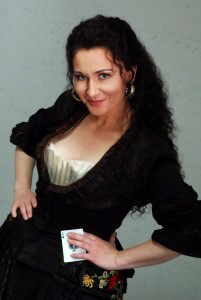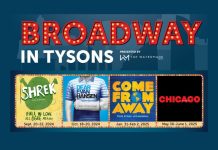Mezzo-soprano Magdalena Wór pretty much creates an unforgettable impression everywhere she performs. Her strikingly rich voice – it’s been called “plush,” “chocolatey” and other adjectives redolent of red-wine reviews – stands out from the crowd of rising opera singers. And she doesn’t need a full opera staging to demonstrate stage presence. Even after straight concerts, listeners often tell her it almost doesn’t matter what language she’s singing in, they can tell exactly what’s going on in her songs.
So would you believe she didn’t even take classical voice lessons until age 18? You might believe it once you know her intriguing biography – and once you absorb the major role that Washington eventually played in her life and her artistic development. Originally from a small town in Poland, Magdalena has lived in both New England and Georgia and squeezed in vocal training at a little-known college musical program in between an English literature degree. It was really her intensive time with the Washington National Opera’s Domingo-Cafritz Young Artists program from 2006 to 2008 that sent her on her way, a time that she speaks of with great affection and gratitude.

I caught up with Magdalena by telephone at her home in the Atlanta area prior to her return here as the mezzo soloist this coming Saturday, April 11 in the National Philharmonic’s performance of Bach’s St. John Passion at The Music Center at Strathmore. Here are excerpts of our conversation.
David: Tell our readers some of your biographical background.
Magdalena: I came to the United States when I was 11. My father’s job brought us here. But we ended up for five years in Maine first. I learned English up north. And we came down to Georgia in Halloween of 1996, so in the fall right after the Olympics. But even though I was always involved in church singing – I was a cantor in a Catholic church in Poland since I was seven years old and then in the United States since I was twelve – I never thought of a career in music. And I met my mentor [a teacher at Georgia State University] two years before I even took a voice lesson. I was actually thinking of going into computers!
Just half a year before I auditioned for college, it was my mother, actually, who gave my mentor a call and said, “Could you please just have one lesson with her and see if a career in music, especially in singing, is something that she could consider going in?” And the funny thing is that one lesson turned into weekly lessons at 9 o’clock in the morning on Sunday morning. I mean what other teacher would do that? I mean, I was the cantor at the 7:30 mass and then I would drive straight 45 minutes to where she lives to have a lesson a 9 o’clock in the morning.
Then half a year later I got accepted to Georgia State. Then I did my first young artists program at Georgia State, and then one in San Francisco. That was in 2003 and I got invited into the Western Opera Theater tour. We were going to tour for the whole fall with The Barber of Seville all over the United States, but that was the year that the Western Opera Theater tour closed and completely shut down. So I called back Georgia State and they very quickly were able to get me back in and I did my masters. Then I took a year off [from school] and just auditioned for various opera programs, including Juilliard. You see, I never really had that much opportunity to perform. We only put on one opera a year at Georgia State, and for quite a while it was just twentieth century operas, so here I am, done with my bachelors and masters and I’ve done mostly just twentieth century operas!
Twentieth century operas by what composers?
We did Copland’s Tender Land – that was the first opera I ever did! – and then we did The Crucible the following year. And then the following year I was not in anything because I was in the finals at the Metropolitan Opera for the national Metropolitan Opera auditions. Finally in my last year they were able to make some changes with the theater and we did the Merry Wives of Windsor. It was close enough! What a young student needs. Finally, in the fall of 2005 and the spring of 2006 I auditioned with several more Young Artists’ programs and got accepted into Washington.
What were the years that you were involved in the Domingo-Cafritz program?
It was August of 2006 through May of 2008.
And did you live in Washington, D.C.?
I did, I lived in Beltsville, Maryland.
And how did you like living in this area?
I loved it, it was some of the best times of my life. Today Georgia State’s music department is a lot more known, but then it wasn’t, it was a tiny, tiny department. It lacked a lot of things, you know – when you have the opportunity to go to conservatory, they have a lot more education-wise, they teach them everything they need, diction classes, they bring in these amazing master clinicians, acting classes, quite often there are management classes. But I didn’t have that, I mean even our diction classes were quite often interrupted by other things.
So when you came to Washington you got to broaden your experience and your repertoire.
Oh it was amazing. You know the [Domingo-Cafritz] program was still very young, I believe it was only five years old when we got there. And the people before us really, really worked hard to establish a great relationship with the mainstage. And the way they did it is was that they worked very, very hard, they were prepared, they came on time, they were very professional. So by the time we got there, they offered the Young Artists all the smaller roles. There was no auditioning for it, you were a Young Artist of the Washington National Opera so whatever small roles were there, they were given to you
Because of that, the two years I was there I was constantly working, whatever there was it was distributed among us based on our voice type. The first thing we did was a double bill of Gianni Schicchi and Bluebeard’s Castle, and you’re going to laugh because that [Bela Bartok’s Bluebeard’s Castle] became – you know how sometimes a production will really speak to you in the most profound ways? That really affected me immensely. I was there at every single rehearsal and throughout all the productions. We in the Young Artists program even had a week off, but I kept going and people kept asking me why I was there!
How much Italian opera did you do in this program? Is that where you got to expand your knowledge of Italian opera and the mezzo roles?
Yes, I did Rigoletto, I covered Maddalena and I did the role of Giovanna. Four days a week we had classes in Italian, not just diction but language classes with our teacher who would come four days a week, every single week.
And in German opera I was part of the now really well-known production by Francesca Zambello of [Richard Wagner’s] Die Walküre, because the Washington Opera was hoping to do the full Ring Cycle but the economy just crashed and it was canceled – although they’re going to do the full Ring Cycle next year, right? I was one of the flying Valkyries, I was suspended in air. It was a tremendous show, it was just wonderful. And we had master clinicians come in and coach us in [German] diction.
Are people surprised that you are Polish by background given your name? Do they think you’re Italian?
Yes, but quite often with my dark hair people think I’m Spanish!
Have you ever gotten the opportunity to perform in Polish, I mean since you were a child?
Sometimes. There are quite a few songs. Our most famous composer when it comes to that is Moniuszko. But Chopin also wrote 19 songs. They’re not considered his best work, the way they’re written they’re very uncomfortable for both sopranos and mezzos, but they have some beautiful texts in them. I had the opportunity to do all 19 of them in 2010 in London, but that was the last time. Still, quite often when I do a recital I try to include some Polish repertoire.
How long does it take to perform all of the Chopin songs, about an hour?
About an hour, yes. Some of them are wonderful, they very much have a Polish flavor to them. And there are a couple really dramatic ones. There is this one called “The Betrothed” and it has the most amazing runs in the piano from the beginning, it’s like a thunder, it’s just fantastic.
I think you have also performed with the Russian Chamber Arts Society here in D.C.?
Yes, recently last fall, and I’m actually scheduled to come back because [next season] is the year of Shostakovich, so I will be doing a Shostakovich cycle for them in the fall. But I will first be back for their opening gala which I think is in October. [RCAS Founder and Artistic Director] Vera Danchenko is really amazing, and she’s built this from scratch. What’s really great is that she really knows how to teach Russian diction. She works with Peabody, she’s also a tremendous pianist but she really knows how to teach Russian diction to anyone. Just because I’m Polish people think it’s easier for me to pronounce Russian. I can understand it – I can understand most of the sentence. However, when it comes to pronunciation, it’s not always the easiest for me, so she really knows how to help out with that.
And do you continue in church music?
I really laugh, because it’s a running joke – when I first started singing classically, I had what is known as “cantor disease,” which is straight-tone singing. I had to quickly unlearn that [for opera]. But because of that, I really enjoy singing baroque music, because I don’t have to do anything with my voice essentially!
How does your background, just from being a little girl all the way up to now being involved in church music and baroque music, help you do something like the St. John Passion?
I think it’s because I know the prayers and I know the Gospel. I mean the readings – I’ve heard them since I was a little girl. All of it is easy for me to relate to it because when I do this it’s not to me just another show. To me, these types of concerts have a meaning because that’s my faith and I believe in that.
Now with saying this, I realize there are people who come who are not of the same faith, and I believe that that doesn’t matter. There’s a musical side to it. And I think for this particular piece, or every piece, there’s some kind of a meaning and some kind of a feeling that the audience experiences. I’m not there to convince you of my faith, this is a performance, right? But I’m hoping that you’re going to have this feeling of some kind of inspiration, there’s such a mix of emotions, after all it has to do with the life and the death of Jesus Christ.
So I hope when people come just as a performance they’re going to be left with a sense of, Wow, what a profound sadness, right? What a tremendous experience, this person, if you’re looking at it as a person, what he went through, and what beautiful music that accompanies the sadness or maybe there’s a hope in it, you know?
Have you sung the St. John Passion before?
No, it’s my first time! I have never had the opportunity before. What’s really interesting in my life is, for example, I did not do my first Messiah until 2009 with the Atlanta Symphony. And what’s really funny is after 2009 people assumed that I’ve done a ton of Messiahs because it’s such a standard repertory piece for the mezzo. And then I would tell them no and they would be so surprised. So finally when I was able to do my first one, after that, I was able to do a lot of them. So I’m hoping the same thing is going to happen with the St. John Passion.
You have a substantial history with the Atlanta Symphony, is that right?
Yes I have. My first time was Bach’s Magnificat with the Atlanta Symphony in 2006. They’ve won some amazing awards and they’re very well-known but it’s interesting that you’re asking about because just this past fall that they got locked out [in a labor dispute]. We were just all terrified because Atlanta is struggling as a music place, because it’s very much known for its sports but when it comes to the arts it’s really depressing. But the Atlanta Symphony was always our hope. They really bring in world-famous singers and they’re very well attended. Finally they were able to come to terms with the management, and the Messiah I did with them in December was three weeks after they set foot back on stage. So there were still emotions involved and everybody was so thrilled to be back.
There’s also not enough education. These days quite often when I do a performance somewhere, especially with symphonies, I get asked if I would mind doing an outreach program for schools, and I jump on it right away and I say of course I won’t mind. Because these kids never have the opportunity to go into a symphony hall at all during their childhood and how can you learn about something if you don’t get to experience it?
Do you consider it different in Washington?
I’ll be driving to D.C. on April 9th and when I drive into D.C. I always have a grin on my face. If somebody were to see me they would think something amazing has happened. Well it has! Because every single night there is something going on in D.C. – not just music, just culturally. And so many things are free and open to the public, which here [in Atlanta] we just don’t have.

Do you have any drama training that is at all formal?
No, none at all.
So when you’re on stage is it what you were describing as really meaning the lyrics? Does your stage presence come from some other place?
I think it’s both. It’s the way with first of all the words and I also have a wonderful pianist coach who was good at breaking out the words and not to just give vague expressions that you might mean something. It’s the text. And then it’s something that I’m lucky to have, people often tell me that they get it – even when they don’t have the translation they understand what I’m trying to say. I’m very humbled by that but I also appreciate it.
Your striking voice – is it just something that happened, is it something by design, how aware of it are you?
It’s natural. My teacher is not only a performer, she’s also a very good technician, she’s always taught me to be very natural with my voice and not do anything unusual with it. Even now it naturally changes and it gets more color. I don’t do anything with it, it’s not on purpose.
What kind of recommendation do you have for when people should start singing and start taking lessons or other kinds of musical training?
I think I have an opinion that differs from other people, because I started taking lessons so late. I think voice lessons should not be started earlier than the age 16 because it allows the voice to naturally grow, and in the meantime students should definitely learn about music theory and take an instrument – piano is great for singers – or any other instrument. And they don’t have to automatically start singing classical music. I did not start training classically until age 18. I think that a lot of times children start too early and the voice is not allowed to mature and grow.
If you start at age 16 what should you be singing then?
I think musical theater is great. I think a lot of the songs from the 40s, 50s and 60s are great. But not every single song out there is good for every voice type. I think it’s a matter of finding someone, a teacher, who caters to the student’s needs. It’s just because that repertoire has such an abundance, you can even pick duets and teach kids to co-work with other people on stage. It’s a fine line, all of it. Hopefully you find a teacher who knows your voice.
LINK
Magdalena Wór’s website.




